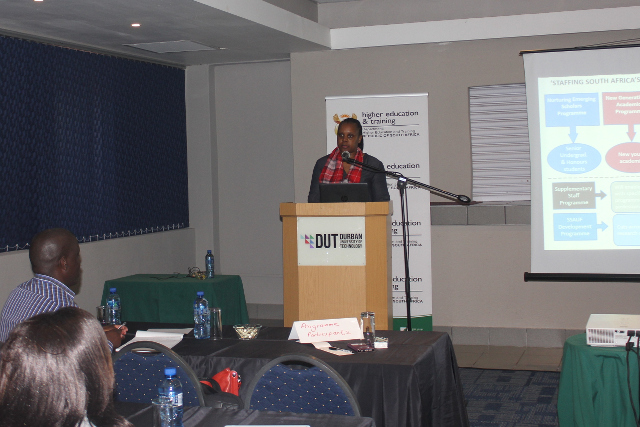Having new and innovative ways to promote teaching and learning at tertiary institutions is the aim of the Department of Higher Education Training (DHET) – and with the new system of employing a New Generation of Academics Programme (nGAP) lecturers at various institutions, it is certainly proving to be the way of the future.
Currently, according to DHET, the South African University system as a whole is experiencing severe challenges in relation to the size, composition and capacity of its academic staff. In relation to those challenges, the Department of Higher Education Training in conjunction with DUT’s Centre for Excellence in Learning and Teaching (CELT), recently hosted a workshop with New Generation of Academics Programme (nGAP) lecturers and their mentors at the DUT Ritson Campus.
The aim of the workshop was to discuss issues regarding the entire nGAP programme, entailing the recruitment of highly capable scholars as new academics, against carefully designed and balanced equity considerations.
According to DHET, it is envisaged to be the biggest programme within the Staffing South Africa’s Universities Framework(SSAUF).
Therefore, the (SSAUF) have embarked on such a programme to identify and nurture academic talent early in the academic development trajectory, at senior undergraduate level or early postgraduate level; and to support newly recruited academics to acquire doctoral degrees (or Master’s Degrees in selected fields).
Speaking at the workshop was DHET representative, Mandisa Cakwe, who said that the most important features of the programme were that successful applicants would be appointed into permanent posts and firmly factored into long-term staffing plans right from the outset.“The nGAP covers a six year period for each cohort taken onto the programme, covering a three-year development programme, plus three years induction thereafter,” she said.
She also said that the Government will carry the full cost of the post for the first three years, with cost-sharing mechanisms between government and the appointing University from the fourth year of the programme and that institutions were required to bear the full employment costs for the post after six years.
“nGAP academics will undertake a reduced teaching load, be assigned a mentor for the duration of their participation in the programme. Mentors are envisaged to be experienced, successful academics, or recently retired academics. The duties of mentors will include providing assistance with the preparation of a personal plan for professional development and opportunities for reflective discussions on teaching and research experiences, opportunities and challenges,” added Cakwe.
She reiterated that universities are expected to provide an annual report to the DHET on the progress of nGAP academics at the end of each year of the six year cycle and that having such lecturers will enhance and develop teaching expertise, develop research skills, and enable the recruitment of supplementary staff to enhance and strengthen teaching and research at universities.
According to DHET, advertisements for nGAP lecturers have already been advertised earlier this year(2016) and the number of posts that will be made available, and the intervals between successive cohorts, will be determined by the ability of DHET to source funding for successive cohorts.
Besides the presentations of the workings of the nGAP phases that were presented at the workshops, talks on the experiences and challenges of the implementation of the nGap programme were also discussed.
DUT’s CELT Director, Prof Thengani Ngwenya, said: “DUT hosted a very informative workshop on the New Generation of Academics Programme (nGap). DHET officials in charge of the programme explained in detail the processes and procedures relating to this transformative programme. The nGap programme seeks to provide opportunities for young people to become academics and researchers in various University departments. Essentially, this is a national strategy for recruiting, training and mentoring young people who would like to pursue academic careers in South African universities. The programme is funded by the DHET and affords the aspirant academics the opportunity to develop and grow intellectually. Currently DUT has two young academics who are participating in the programme. There process of recruiting more junior academics for the second phase of the nGap is already underway at DUT and five new posts have been created for this purpose.”
For more information on the programme, go to http://www.dhet.gov.za/ssauf/ngap.html.
Pictured: DHET representative, Mandisa Cakwe talking about the important role nGAP lecturers and mentors play at universities.
—Waheeda Peters


